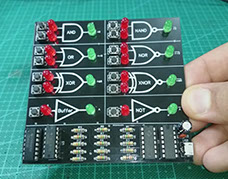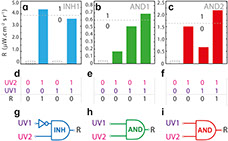


<
>
PHOTONIC HYBRIDS AND NANOMATERIALS GROUP
Aveiro-Portugal
university of aveiro
theoria poiesis praxis
physics department
ciceco
aveiro institute of materials



MOLECULAR LOGICS USING TRIVALENT LANTHANIDE IONS
The persistent demand for faster, reliable, smaller, and smart electronic devices triggered the research in semiconductors for performing logic operations, silicon being the most widely used element in electronics. However, the continuous and
exponential demand for computing power combined with further miniaturization is currently struggling with the intrinsic limitations of the bottom-up photolithographic patterning techniques.
Molecular information processing and computing based on molecules able to perform logic operations (i.e., moleculators) were introduced in 1988 by Aviram, who propose the use of small molecules as alternatives for the storage and transmission of binary data. Later, Prasanna de Silva et al. reported an AND gate, actuated by cationic species. Since then, supramolecules, enzymes, DNA, and polymers have been used to encode and process information.
Among the distinct emitting centers reported so far for molecular logics, lanthanide ions (Ln3+) containing materials (both inorganic crystals and β-diketone complexes) appear as a sagest choice as these systems can respond to both chemical and physical stimuli.
PEOPLE
Carlos D.S. Brites
Luís D. Carlos
Rute A.S. Ferreira
Miguel Rodríguez
Albano Neto
Sofia Zanella
RESEARCH HIGHLIGHTS
Sofia Zanella, Miguel A. Hernández-Rodríguez, Lianshe Fu, Luís D. Carlos,
Rute A. S. Ferreira, Carlos D. S. Brites, "Reprogrammable and Reconfigurable Photonic Molecular Logic Gates Based on Ln3+ Ions" Adv. Optical Materials 2200138(2022), http://dx.doi.org/10.1002/adom.202200138
The miniaturization of the silicon chips is reaching its physical limits, and the transistors are so small that current leakage will become an insurmountable problem. Additionally, the actual chip shortage makes clear the excessive world dependence on silicon, stressing the need for silicon-free computing strategies. Quantum computing process information by manipulating photons, and computation performed by individual molecules are being proposed as alternatives, with potential benefits in terms of miniaturization, performance enhancement, and energy efficiency. Molecular logics can play a decisive role in the future of the computer industry, and the unique photonic characteristics of trivalent lanthanide ions make them suitable candidates to integrate future molecular logic applications. In this work, a Eu3+/Tb3+ co-doped organic–inorganic hybrid is presented as an illustrative all-photonic logic platform constructed through the decay dynamics of both lanthanide and hybrid host emissions. Besides combinatory AND, NAND, and INH logic gates, this system presents on-choice Eu3+, Tb3+, or host emission enabling the development of reprogrammable and reconfigurable photonic molecular logic gates. All-photonic temperature-reprogrammable changes from AND to INH logic gates and a reconfiguration among INH and AND1 or AND2 gates, based on the excitation wavelength are demonstrated, showing a clear step forward toward mirroring electronic logic counterparts.



MADE BY PHANTOM-G, AVEIRO, PORTUGAL
